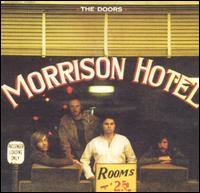M.H. 

The Doors returned to crunching, straightforward hard rock on an album that, despite yielding no major hit singles, returned them to critical favor with hip listeners. An increasingly bluesy flavor began to color the songwriting and arrangements, especially on the party and booze anthem "Roadhouse Blues." Airy mysticism was still present on "Waiting for the Sun," "Queen of the Highway," and "Indian Summer"; "Ship of Fools" and "Land Ho!" struck effective balances between the hard rock arrangements and the narrative reach of the lyrics. "Peace Frog" was the most political and controversial track, documenting the domestic unrest of late-'60s America before unexpectedly segueing into the restful ballad "Blue Sunday." "The Spy," by contrast, was a slow blues that pointed to the direction that would fully blossom on L.A. Woman.


The Doors returned to crunching, straightforward hard rock on an album that, despite yielding no major hit singles, returned them to critical favor with hip listeners. An increasingly bluesy flavor began to color the songwriting and arrangements, especially on the party and booze anthem "Roadhouse Blues." Airy mysticism was still present on "Waiting for the Sun," "Queen of the Highway," and "Indian Summer"; "Ship of Fools" and "Land Ho!" struck effective balances between the hard rock arrangements and the narrative reach of the lyrics. "Peace Frog" was the most political and controversial track, documenting the domestic unrest of late-'60s America before unexpectedly segueing into the restful ballad "Blue Sunday." "The Spy," by contrast, was a slow blues that pointed to the direction that would fully blossom on L.A. Woman.
Sem comentários:
Enviar um comentário